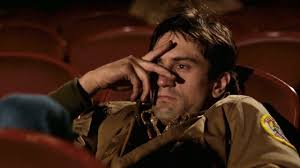Taxi Driver

While Steven Spielberg and “Jaws” were defining the concept of the summer blockbuster for moviegoers, another young director by the name of Martin Scorsese was preparing his latest film for distribution in early 1976. Based on a nihilistic script by Paul Schrader and featuring a landmark performance by Robert DeNiro, the release would ultimately be nominated for Best Picture. And although it would lose this race and not have much impact at the box office, it would cement its director and his film as essential touchstones of the New Hollywood era.
Other influential films would follow throughout the year, such as Alan J. Pakula’s powerful “All the President’s Men”, chronicling the Watergate scandal and its resulting presidential resignation. The year would also include Sidney Lumet’s prescient “Network”, an indictment of the media industry which anticipated reality television and partisan theatrics decades before they became the accepted norm. In addition, audiences would be thrilled by Brian DePalma’s terrifying “Carrie”, featuring brilliant performances by Piper Laurie and, of course, Sissy Spacek (with its deserved spot on the Best Picture ballot taken by Hal Ashby’s standard Woody Guthrie biopic “Bound for Glory”).
Each of these films would ultimately be surpassed by John G. Avildsen’s triumphant underdog tale “Rocky”. Becoming the first film since “The Godfather” to both win Best Picture and top the year’s box office, “Rocky” combined the gritty and realistic style of New Hollywood with a feel-good ending highlighted by one of cinema’s most inspiring musical scores. Written in less than a week by a then unknown Sylvester Stallone, who held onto the films rights to secure the starring role, the story is expertly presented, with an emotional intelligence that imbues each character with motivation and individuality.
Like the previous year’s “Jaws”, an audience’s memory of the film will recall its excitement and exhilaration, both of which are visceral and undeniable. But rewatching the film again, it is the sparce and quiet tone of the opening scenes that set the mood for the emotional climax. Opening with the now famous title scroll and trumpeted theme, the camera immediately pans down to a boxing match on the outskirts of the profession; two men fighting with minimal crowd interest and less accompanying pay.
The Rocky Balboa of this opening chapter of the franchise is not expecting things to get better. Although not bitter, he has accepted his circumstance, even supplementing his income by acting as muscle for the local loan shark. Ironically, his destiny is redirected not through his own action, but through the hand of fate, as he is picked for a bout with the champion based on little more than his colorful nickname.
As he shares with his girlfriend Adrian the night before the event, he knows he is unable to win, but wishes to at least go the distance. Ultimately, he does lose but finishes standing, as the judges’ decision takes a back seat to his emotional reawaking, embracing Adrian in the center of the ring and professing his love.
The ending of “Rocky” has been often imitated, but its impact never replicated. Beginning with the final bell, the theme comes back in force, overtaking the soundtrack and underscoring Adrian’s way through the crowd, including the loss of her hat and her eventual climb through the ropes aided by her brother Paulie, providing our underdog with the victory he needed, if not the belt he wanted. Audiences were left ecstatic, wanting to experience the movie again; in other words, the mirror opposite of the feeling left by “Taxi Driver”.
Scorsese had established himself with his release of “Mean Streets” a few years earlier, which had made its impression with various national critics but had not connected with audiences beyond the independent minded cineaste. With his next release, he would look to expand his reach, and tackle on a grander scale some of the passions with which he had personally struggled. Upon reading Schrader’s script, he felt he had found not only his next project but also, having worked previously with DeNiro, the actor that could potentially embody the central character of Travis Bickle.
The protagonist of the film, Travis is a deeply lonely, mentally unstable Vietnam War veteran who works nights as a cab driver in New York City. As the film progresses, he becomes increasingly detached from reality, leading him to plan violent actions in a futile attempt to cleanse the city of its perceived corruption. His eventual descent into madness and the resulting violent climax highlights the themes of personal isolation and societal decay that the movie intimately explores.
The film is presented from Travis’ perspective, sharing his mindset with the moviegoer as he methodically spirals into psychosis. Following twin paths toward human connection, Travis attempts to date the confident political operative Betsy (a perfectly cast Cybil Shepard) before befriending the underage street prostitute Iris (an immensely moving Jodie Foster). In possibly the film’s most uncomfortable scene, the camera wanders from Travis as he speaks on a payphone with Betsy, focusing on an empty hallway rather than witness his utter humiliation. Following his last approach and her final rejection, Travis breaks, focusing only on Iris and devoting himself fully toward what he believes to be his sacrificial destiny.
The courage and complexity of DeNiro’s performance is difficult to access from today’s perspective. Currently regarded as one of the greatest performances put to film, it was a part that would prove difficult for audiences at the time to embrace, and the industry as well, with DeNiro inexplicably losing the Best Actor to posthumous winner Peter Finch. Expressing thoughts and motivations driven by hatred and feelings of impotency, DeNiro captures the pathetic nature of a discarded man seemingly left with few options.
Setting a new standard for character-driven storytelling intensely focused on psychological instability and urban alienation, Scorsese and DeNiro created a film that has inspired works which delve into the darkest aspects of the human psyche. Its influence on raw honesty and artistic risk in cinema continue to resonate.

5 thoughts on “Taxi Driver”
Pingback: New York, New York - Cinema Thing
Pingback: The Deer Hunter - Cinema Thing
Pingback: The King of Comedy - Cinema Thing
Pingback: Martin Scorsese (1973-1983) - Cinema Thing
Pingback: Star Wars - Cinema Thing